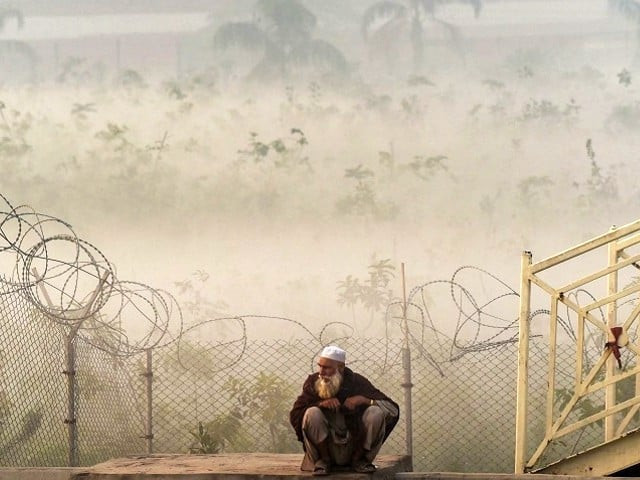How does COP26 impact Pakistan?
Country can use awareness created by conference to reduce smog, city pollution

The Glasgow Climate Change Conference concluded last week was the 26th so far, but it is one of the most significant for several reasons.
It is the first-ever conference to agree on “phasing down” coal, responsible for about 40% of annual CO2 emissions.
It agreed to cut methane emissions by 30%. Methane has more than 80 times the warming power of carbon dioxide and is responsible for about a third of the global temperature increase.
Another critical undertaking is to halt and reverse deforestation by 2030. Also, surprisingly, the United States and China, despite their aggressiveness elsewhere, agreed to take steps for a range of climate issues, including the transition to clean energy and decarbonisation.
The host, UK Prime Minister Boris Johnson, described the agreement as “a roadmap to limit global warming to 1.5 degrees” and “a big step forward … the beginning of the end of climate change”.
John Kerry, the US envoy for climate, expressed similar sentiment and said it was always unlikely that the Glasgow summit would result in a decision that “was somehow going to end the crisis”, but that the “starting pistol” had been fired.
On the other hand, climate activists such as Friends of the Earth International said the outcome was “nothing less than a scandal … Just saying the words 1.5 degrees is meaningless, if there is nothing in the agreement to deliver it. COP26 will be remembered as a betrayal of global South countries.”
A representative of ActionAid stated that the agreement “gives a free pass to the rich countries which have been extracting and polluting for over a century to continue producing oil and gas”.
Many climate activists held a symbolic “funeral for COP26” at the Glasgow cemetery to show their outrage.
Neutral observers believe that even with the latest pledges and commitments made in the Glasgow Climate Pact, emissions will continue to increase until 2030, whereas to have a chance of limiting warming to within 1.5 degrees, global emissions must halve by 2030 and reach “net zero” by 2050.
The current pledges mean that the average temperature will continue to rise by 2.7-degree Celsius by the end of the century. Such an outcome would lead to catastrophic changes in the earth’s climate.
They were also dismayed that there was no clarity regarding meeting the financial commitment made by developed countries over a decade ago to provide $100 billion per year to developing economies by 2020.
How would the expected 2.7-degree rise in temperature impact Pakistan, already rated as the eighth most vulnerable country (Global Climate Risk Index 2021) to climate change?
Over the last two decades, due to extreme weather events, Pakistan is estimated to have suffered economic loss ranging from $1.3 billion (UNISDR) to $3.8 billion (Germanwatch) annually.
If the temperature rises by 2.7-degree Celsius, the implications for Pakistan would be dire. It is already a “water-stressed” country and will see severe droughts. There will be increased coastal erosion and seawater incursions.
Our major crops, such as cotton, wheat, sugarcane, maize, and rice may have up to 25% lower yields. Temperature rise will result in rapid glacial melting, and there may be more frequent floods with consequential human and economic losses.
Being in such a vulnerable situation, we should be more proactive. Although a very competent adviser to prime minister represented Pakistan at the conference, it would have been much better if Pakistan was also represented by its prime minister like dozens of other countries.
This would have given us access to bilateral meetings with several heads of states to apprise them of our financial needs, estimated at around $14 billion per year, to better adjust to the climate change.
A few countries were able to get individual pledges of financial assistance. For example, South Africa managed to get $8.5 billion from the US, EU and UK over the next three to five years to speed up the shift from coal.
Pakistan is highly dependent on fossil fuels. It needs similar investment to move from fossil fuels to renewables and hydroelectric power projects.
Our internationally acclaimed projects like the “Ten Billion Tree Tsunami” need technical and financial support to achieve their objective.
The global community made pledges amounting to $19.2 billion in public and private funding for ending deforestation and increasing forest cover.
Finally, Pakistan can use the awareness created by the conference to address its ever-rising levels of smog and city pollution urgently.
Pakistan was ranked at number two out of 106 countries for having the worst air quality in 2020.
According to the air quality and pollution city ranking data of November 18, 2021 released by IQAir, a global environmental think tank, Lahore is the most polluted city in the world, with the city’s Air Quality Index (AQI) standing at 372.
This pollution exacerbates health problems, including an increased rate of illness, diseases and mortality. A significant contributor is the transport sector.
Many major auto producers and world leaders have given ambitious time frames at the Glasgow summit to switch to electric vehicles. Pakistan is seriously lagging. We need to act urgently on all our environmental issues before it is too late.
The writer has served as Pakistan’s ambassador to WTO and FAO’s representative to the United Nations at Geneva
Published in The Express Tribune, November 22nd, 2021.
Like Business on Facebook, follow @TribuneBiz on Twitter to stay informed and join in the conversation.



















COMMENTS
Comments are moderated and generally will be posted if they are on-topic and not abusive.
For more information, please see our Comments FAQ